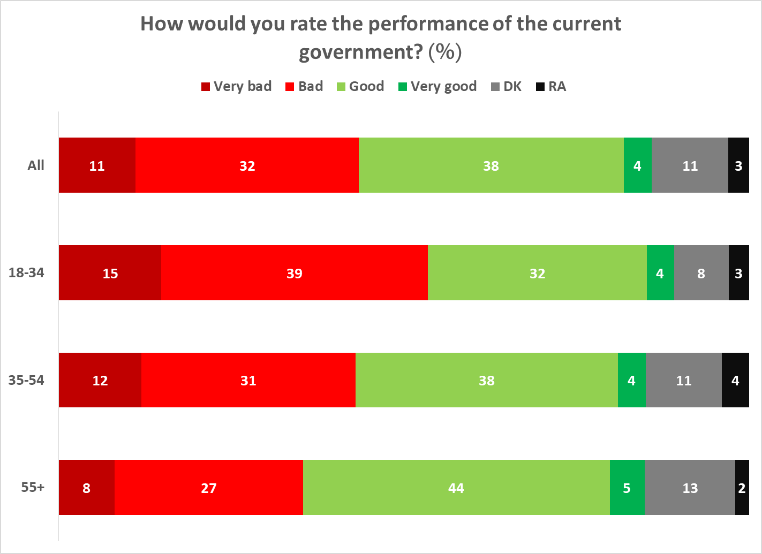What Young Georgians Think About Their Government
Surveys in Georgia show that the young generation in particular disagrees with their government’s politics. Interviews with Georgian migrants in Berlin confirm these findings. The interviewees are especially critical of decisions that are perceived to be pro-Russian.

The current government of Georgia is often criticised for turning its back on the West and taking pro-Russian stances, starting with not sanctioning Russia, refusing to provide weapons to Ukraine, and ending with the reopening of direct flights with Russia. These actions, which sparked waves of protest on the streets of Tbilisi, culminated in an attempt by the ruling party, Georgian Dream, to adopt legisation which would make it possible to discriminate against and fine certain civil society organisations as ‘foreign agents’, a label Russia has used for ‘enemies’ from the West. Young people played a prominent role in the major protests on 7 and 8 March 2023, after which the government had to withdraw its decision to adopt the law. This article looks at attitudes towards the government’s actions among young people living in Georgia and presents qualitative narratives from those who left the country to live in Berlin, Germany.
Views among young people living in Georgia
The findings of a survey, conducted by the Caucasus Research Resource Center - Georgia (CRRC-Georgia) in March 2023, shortly after the Georgian government tried to adopt the Law on Transparency of Foreign Influence, show that roughly the same proportion of people in Georgia rate the performance of the current government positively (42 per cent) and negatively (43 per cent), while 11 per cent find it hard to answer the question. In a comparison of different age groups, young people aged 18 to 34 are more sceptical towards the government, with over half (54 per cent) saying that its performance is ‘bad’ or ‘very bad’. In contrast, only about one third (35 per cent) of the older age group (55 and above) report the same.
Source: NDI survey conducted by CRRC-Georgia, March 2023
At the same time, 53 per cent of the 18-34 age group disagrees with the statement that the ruling party, Georgian Dream, is acting in the best interests of the country and the Georgian people. The share is lower among older age groups. Moreover, when asked whether the Georgian Parliament should have adopted the Law on Transparency of Foreign Influence, 70 per cent of young people responded negatively, while the percentage was lower among older age groups.
Source: NDI survey conducted by CRRC-Georgia, March 2023
Voices of young Georgian emigrants
In view of these survey findings, it is not surprising that the number of young people (aged 15 to 34) who are leaving the country has increased during the last three years, reaching over 54,000 in 2022.
Source: National Statistics Office of Georgia, 2013-2022 data
Data from qualitative interviews conducted in Berlin in summer 2023 with 30 young Georgian emigrants from different socio-economic backgrounds as part of a study funded by Georgia’s Research Mobility Programme and hosted by ZOiS also confirmed their critical attitudes towards the Georgian government. Respondents claimed that they would not wish to go back to Georgia while the current government, which leans towards Russia over the West, is in power. While young people want Georgia to be a part of Europe, they claim that they do not like the political situation and do not agree with the current political trajectory. On the other hand, they feel a responsibility to contribute to the country’s development:
‘I think that the government is pro-Russian which I disapprove of, but I also think that the government and people are not the same. […] I do not want to be someone who ran away from their country, who could not stand it there and just left. That’s who I am at this point, but I do not want to be running my whole life. I want to have my say [in the country’s development].’ (woman, 26, moved to Berlin in 2022)
On the other hand, some of the respondents think that the majority of people in Georgia are not as critical as they should be towards the government. They claim that despite the clear pro-Russian steps taken by the government, not enough people are protesting against Russian influence. Respondents point out that Russian propaganda is generally very effective but people should have the level of education to differentiate information from disinformation. They claim that Georgia is clearly dependent on Russia and its politics and that individual freedoms are being violated.
‘It is very obvious that we are directly dependent on Russian politics and that means that we are not a free country. And when the country is not free, the individuals cannot be free at some point. […] Freedom is so important for me that I cannot give it up even for my love of Georgia.’ (man, 22, moved to Berlin in 2019)
Some of the young emigrants involved in the study feel that they have a responsibility to help improve the current state of affairs in Georgia and believe that they should take the initiative to change the situation; they say that they would gladly take part in government if they knew they could make a change:
‘If I say now that I will not return until the situation has changed for the better [in Georgia], who am I expecting to make the changes there? Should those left behind in Georgia take everything on their shoulders, while I am living well and getting my education here [in Berlin]? [In reality] it is me who should be making the change.’ (man, 28, moved to Berlin in 2022)
To summarise, while more than half of young people in Georgia are critical of the Georgian government, the number of young people leaving the country has increased during the last three years. Young emigrants actively follow ongoing events in Georgia and disagree with the current state of politics, which they assess as rather anti-western. Most of them do not want to be in emigration forever and are considering returning to Georgia; however, they say that the political situation and loss of individual freedom in Georgia are drawbacks for them. On the other hand, they feel that they have a responsibility to be part of the changes that are necessary for Georgia to remain on its path towards European integration.
Dr Tamar Khoshtaria is a senior researcher at the Caucasus Research Resource Center Georgia and assistant professor at Ilia State University in Tbilisi, Georgia.


